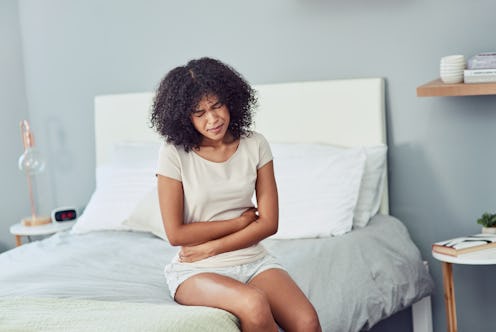Life
Things That Might Indicate IBS, According To Experts

It might natural to get a stomach ache after a big meal (give me a plate of nachos, and it'll be hard to move after), but if your stomach is constantly giving your discomfort, it might be an indicator of Irritable Bowel Syndrome, or IBS (and something you definitely shouldn't ignore). If you just think it'll pass, you'll be surprised; IBS symptoms can be persistent and annoying, and they often need some diet or lifestyle tweaks in order to improve digestion, long-term.
As a certified health coach, I work with clients on boosting their digestion and feeling comfortable in their own skin. It's also a matter of trusting your gut (literally), as if your gut feels whacky, there's probably something strange going on that needs adjustment. And, when your gut is out of balance, it can affect other areas, like your energy levels, mental state, sleep, and bowel movements. So, if you're feeling any pain or having strange bowels (like you can't go easily, or you're going too much), it could be associated with an autoimmune, digestive disorder, like IBS. Here are some indicators of IBS that you should watch out for. If you think you're suffering, see a doctor to get a proper diagnosis and discuss ways to remedy the issue and get back to feeling normal again.
1. Abnormal Bowels
According to Elizabeth Ann Shaw, MS, RDN, CLT, over email with Bustle, "complaints of constipation and diarrhea (alternating bouts)" are common with IBS. If you're not going regularly, or you're experienced swings in texture and consistency, it could be time to see a doctor.
2. Stomach Pain
Shaw cautions against stomach pain, which is super common in people with IBS. Specifically, you might notice "severe bloating and cramping," Shaw says, and it won't subside unless you get to the root of the issue and find a sustainable way to improve digestion.
3. Mucus In Stool
Shaw says you might find weird things in your stool (and not just some orange after eating a few carrot sticks, for instance). In fact, you might find mucus in your stool, Shaw warns, and if you see any, it's best to go see a doctor to discuss the next steps.
4. Excessive Gas
According to Kristen Johnson Brogan, Chief Nutrition Officer at On Target Living, over email with Bustle, you might feel a bit gassier than usual if you have IBS. Of course, being gassy isn't fun (it's smelly and uncomfortable), so it's wise to see a doctor to figure out a way to rebalance your gut and stop the gas.
5. Bad Taste In Mouth
According to Jen Bruno, certified holistic health coach and personal trainer at J.B. Fitness, over email with Bustle, a bad taste in your mouth, one that does not come from food, like garlic, for instance, can signify IBS. So, if you have that sour, icky taste on your tongue, it could be related.
6. Peeing A Lot
Bruno says that if you're always running to the bathroom to pee (even if there's not much pee anyway, but simply the urge), it could be related to symptoms of IBS. If the urge is getting out of hand, consider getting a physical to figure out a diagnosis.
7. Loss In Appetite
According to running coach and personal trainer Susie Lemmer, you might not feel as hungry as usual if you have IBS. Lemmer explains that when your body has IBS, it might become deficient in nutrients and electrolytes, as well as decrease your appetite.
If you notice any of the signs, it could be associated with IBS. To get your digestive tract back in shape, head to the doctor to figure out what's going on.